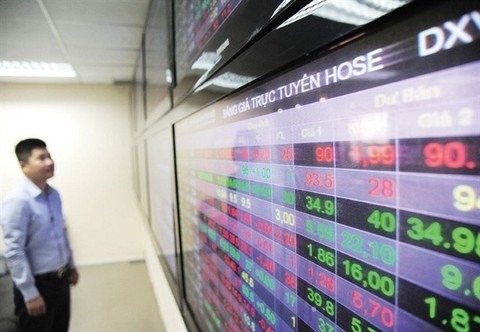|
Market rocked by pressure from exchange rates and interest rates
Việt Nam’s stock market experienced a turbulent week as heavy selling pressure, particularly in the final sessions, drove indices lower.

An investor monitors stock market movements. — Photo baotintuc.vn
|
Experts attributed the decline to rising exchange rate pressures, high interbank interest rates and persistent net selling by foreign investors.
Throughout the week, the market continued its downward trajectory amid unfavourable macro-economic conditions. The VN-Index lost a significant support level and appeared to be heading towards deeper support zones. This volatility raised concerns among investors about the market's short-term prospects.
By the close of the week’s last trading session, the VN-Index had fallen by 33.99 points, or 2.7 per cent, ending at 1,218.57 points. Meanwhile, the HNX-Index dropped by 5.35 points, or 2.35 per cent, to 221.53 points.
Despite a rise in market liquidity, the trend reflected negative sentiment, with trading volume on the HoSE surging by 26.8 per cent, driven by overwhelming selling pressure.
Analysts noted that market breadth was largely unfavourable, with most sectors facing correction risks.
Foreign investors continued their relentless net selling, offloading hundreds of billions of đồng daily, with figures occasionally reaching trillions.
Notably, prominent stocks such as VHM and MSN saw foreign outflows exceeding VNĐ3 trillion in the first half of November alone.
On the HoSE, foreign investors extended their net selling streak to five consecutive sessions, unloading a total of 126.7 million shares worth VNĐ4.03 trillion. Similarly, on the HNX, they sold over 4.6 million shares valued at VNĐ114.93 billion across the week.
Phan Tấn Nhật, head of Analysis at Saigon-Hanoi Securities (SHS), noted that the VN-Index remains in a short-term downtrend below the 1,250-point resistance.
He identified a strong support zone between 1,200-1,210 points, aligning with the peak levels of 2018 and the trendline connecting the market’s lowest points from April and August 2024. He also highlighted that the medium-term trend has shifted to an accumulation phase, requiring a breakout above the 1,250-point resistance to signal improvement.
According to Nhật, the broad-based selling pressure was partly due to foreign outflows, stop-loss activity, and margin reduction by leveraged investors. He projected that deleveraging could persist for another 3-4 sessions, given that margin debt at the end of Q2 stood at VNĐ240 trillion.
However, he noted that the market appeared being oversold in the short term, with the VN30 expected to rebound around 1,260 points, correlating to a recovery of the VN-Index in the 1,200-1,210 range.
Despite challenges, Nhật highlighted that the market's current capitalisation of approximately US$287 billion – around 62 per cent of 2024 GDP – remains attractive relative to the economy’s scale.
With GDP growth expected to remain robust at 6.5-7 per cent in 2025, he advised investors to consider deploying capital into fundamentally sound stocks with strong Q3 earnings and promising growth prospects.
Amid rising short-term risks, experts urged investors to prioritise portfolio risk management. Those holding high allocations or using leverage were advised to reduce their positions during technical rebounds.
Conversely, investors with lower exposure or short-term strategies should refrain from “bottom fishing” until clear signs of a market reversal emerge.
Bizhub
|